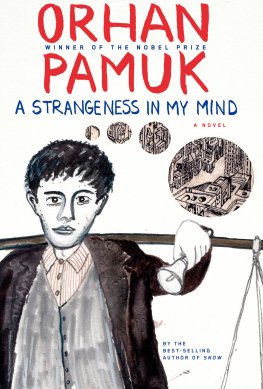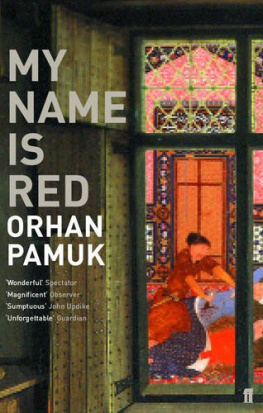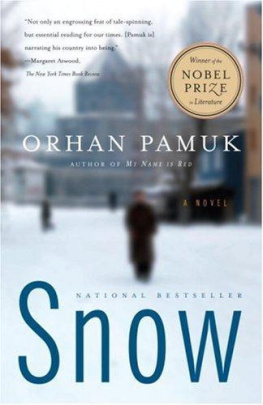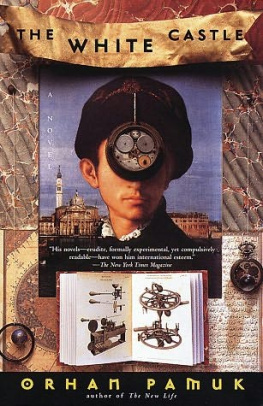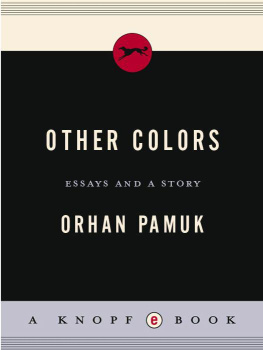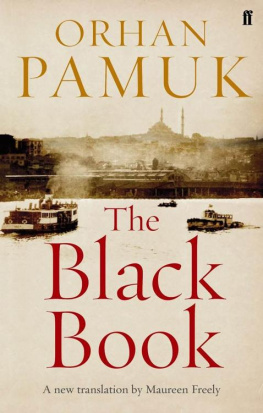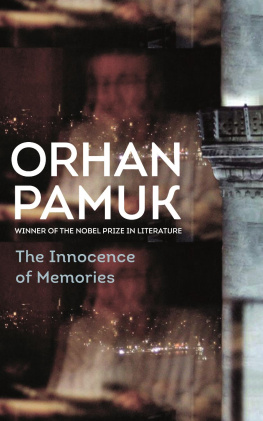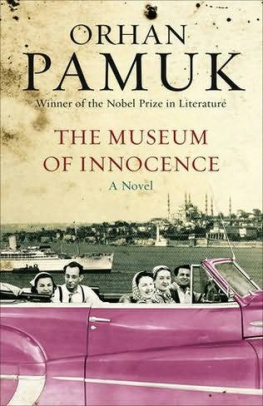Orhan Pamuk
A Strangeness in My Mind
Being the Adventures and Dreams of Mevlut Karata, a Seller of Boza, and of His Friends, and Also a Portrait of Life in Istanbul Between 1969 and 2012 from Many Different Points of View
I had melancholy thoughts
a strangeness in my mind,
A feeling that I was not for that hour,
Nor for that place.
William Wordsworth, The Prelude
The first man who, having fenced off a plot of land, thought of saying This is mine and found people simple enough to believe him was the real founder of civil society.
Jean-Jacques Rousseau, Discourse on the Origin and Foundations of Inequality Among Men
The gulf between the private and public views of our countrymen is evidence of the power of the state.
Cell Salik, Milliyet
The Families of Brothers Hasan Akta and Mustafa Karata, Yogurt and Boza Sellers (Married to two sisters, Safiye Atiye)



PART I. Thursday, 17 June 1982
It is not customary for a younger daughter to be given away while her older sister remains unmarried.
brahim inasi, The Wedding of a Poet
If there is a lie to be uttered, it will not remain unsaid; if there is blood to be spilled, it will not remain unshed; if you keep your daughter close, she will run away instead.
Beyehir proverb (from the precinct of mrenler)
Mevlut and Rayiha Elopement Is a Tricky Business
THIS IS the story of the life and daydreams of Mevlut Karata, a seller of boza and yogurt. Born in 1957 on the western edge of Asia, in a poor village overlooking a hazy lake in Central Anatolia, he came to Istanbul at the age of twelve, living there, in the capital of the world, for the rest of his life. When he was twenty-five, he returned to the province of his birth, where he eloped with a village girl, a rather strange affair that determined the rest of his days: returning with her to Istanbul, he got married and had two daughters; he took a number of jobs without pause, selling his yogurt, ice cream, and rice in the street and waiting tables. But every evening, without fail, he would wander the streets of Istanbul, selling boza and dreaming strange dreams.
Our hero Mevlut was tall, of strong yet delicate build, and good-looking. He had a boyish face, light brown hair, and alert, clever eyes, a combination that roused many a tender feeling among women. This boyishness, which Mevlut carried well into his forties, and its effect on women were two of his essential features, and it will be worth my reminding readers of them now and again to help to explain some aspects of the story. As for Mevluts optimism and goodwill which some would call navetof these, there will be no need for reminding, as they will be clear to see throughout. Had my readers actually met Mevlut, as I have, they would agree with the women who found him boyishly handsome and know that I am not exaggerating for effect. In fact, let me take this opportunity to point out that there are no exaggerations anywhere in this book, which is based entirely on a true story; I will narrate some strange events that have come and gone and limit my part to ordering them in such a fashion as to allow my readers to follow and understand them more easily.
So I will start in the middle, from the day in June 1982 when Mevlut eloped with a girl from the village of Gmdere (linked to the Beyehir district of Konya and neighboring his own village). It was at the wedding of his uncles eldest son, Korkut, celebrated in Mecidiyeky, Istanbul, in 1978, that Mevlut had first caught sight of the girl who would later agree to run away with him. He could scarcely believe that this girl, then only thirteen a child still could possibly reciprocate his feelings. She was the little sister of his cousin Korkuts wife, and she had never even seen Istanbul before that day. Afterward, Mevlut would write her love letters for three years. The girl never replied, but Korkuts younger brother Sleyman, who delivered Mevluts letters, gave Mevlut hope and encouraged him to persevere.
Now, Sleyman was helping his cousin Mevlut again, this time to take the girl away. Driving his Ford van, Sleyman returned with Mevlut to the village of his childhood. The two cousins had hatched a plan to run away with the girl without being detected. According to the plan, Sleyman would wait in the van at a spot about an hour away from Gmdere. Everyone would assume the two lovebirds had gone off to Beyehir, but Sleyman would drive them north over the mountains and drop them off at the Akehir train station.
Mevlut had gone over the plan many times in his head and twice made secret reconnaissance expeditions to crucial locations like the cold fountain, the narrow creek, the wooded hill, and the back garden of the girls home. Half an hour before the appointed time, he stopped off at the village cemetery, which was on the way. He turned toward the tombstones and prayed to God for everything to go smoothly. He was loath to admit it, but he didnt quite trust Sleyman. What if his cousin failed to bring the van to the appointed spot near the fountain? Mevlut tried not to think about it too much; no good could come of these fears now.
He was wearing the dress trousers and blue shirt hed bought from a shop in Beyolu when he was back in middle school and selling yogurt with his father. His shoes were from the state-owned Smerbank factory; hed bought them before doing his military service.
At nightfall, Mevlut approached the crumbling wall around the white house of Crooked-Necked Abdurrahman, the girls father. The window at the back was dark. Mevlut was ten minutes early and anxious to get going. He thought of the old days when people trying to elope got entangled in blood feuds and wound up shot, or when, running away in the dead of night, they lost their way and ended up getting caught. He thought of how embarrassing it was for the boys when girls changed their minds and decided not to run away after all, and he stood up with some trepidation. He told himself that God would protect him.
The dogs barked. The window lit up for a moment and then went dark again. Mevluts heart began to race. He walked toward the house. He heard a rustling among the trees, and then the girl calling out to him in a whisper:
Mev-lut!
It was a voice full of love, the voice of someone who had read the letters hed sent during his military service, a trusting voice. Mevlut remembered those letters now, hundreds of them, each written with genuine love and desire; he remembered how he had devoted his entire being to winning over that beautiful girl, and the scenes of happiness hed conjured in his mind. Now, at last, hed managed to get the girl. He couldnt see much, but in that magical night, he drew like a sleepwalker toward the sound of her voice.
They found each other in the darkness. They held hands without even thinking about it and began to run. But they hadnt gone ten steps when the dogs started barking again, and, startled, Mevlut lost his bearings. He tried to find his way on instinct, but his head was a muddle. In the night, the trees were like walls of concrete looming in and out of view; they dodged them all as in a dream.
When they reached the end of the footpath, Mevlut made for the hill ahead, as planned. At one point, the narrow, winding path through the rocks and up the hill was so steep that it seemed to reach all the way to the clouded pitch-black sky. They walked hand in hand for about half an hour, climbing without rest until they reached the peak. There, they could see the lights of Gmdere and, farther back, the village of Cennetpnar, where Mevlut had been born and raised. Mevlut had taken a circuitous path away from Gmdere, partly to avoid leading any pursuers back to his own village, and partly on instinct, in order to thwart any treacherous scheme of Sleymans.

